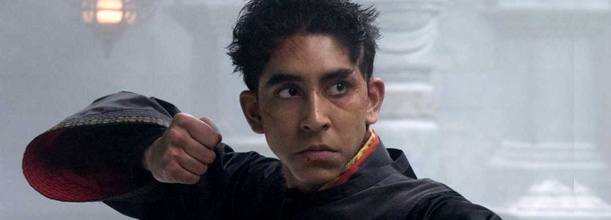The Last Airbender and the racebending controversy

M. Night Shyamalan? He’s the genrebending director as enigmatic and unique as his name. His friend Dev Patel (Slumdog Millionaire, The Last Airbender) refers to him as ‘Night’. That’s a cool name. It’s achingly cool. You know deep in your prosaic bones that it is, and he is. The residual ‘M’ is left hanging there, wishing that if it had to be an initial it could be a Zed at the very least. That ‘M’ is going to have issues when it grows up.
As a film director and scriptwriter, M. Night Shyamalan has had a lifetime of taking pains to deliver a brave storyline that will confound Hollywood but still work magic at the box office. Films like Signs, Unbreakable, The Sixth Sense and The Village are testament to Shyamalan’s skill in weaving a tale that leaves the viewer asking “and what happens next?”
And what happened next is …
Well. Probably not quite what Shyamalan intended.
After a streak of films filed by both critics and box office under “diminishing returns” (whether fairly or unfairly), M. Night is, perhaps, hoping to win back audiences with his latest film, The Last Airbender.
The Last Airbender: Like Avatar, but, like, racist
Avatar: The Last Airbender (to give the work its full name) or ATLA is the film version of a wildly successful Nickleodeon cartoon in which a diverse posse of Asian and Inuit heroes and heroines kick ass and save the earth. ATLA is 100% populated by Asians and the traditional values of eastern philosophy. It’s just like Avatar, really, except the philosophy’s tighter and it’s enormously creative and the heroes are not blue but very definitely brown.
Guess how many Asians and Inuits have leading roles in the Last Airbender film. Go on. Guess.
Here’s a clue. It’s a Hollywood movie.
The Racebending Controversy
We probably don’t need to tell you that the answer is pretty close to ‘none’. You can have a Smartie if you guessed right, but not the orange ones – they’re our favourites. Somehow, all the colour bled away when The Last Airbender translated to the big screen. How strange.
Naturally there are a few Asians and Inuits hovering in the background. They’re essential to the original premise, after all. They’re mostly paid to stand (or leap prettily) around on set looking ethnic and being supportive to the main characters and not saying very much.
In a flourish of institutional Hollywood racism, all the leading roles went to Caucasians. All of them. All, it must be noted, except one: When pop singer (pop singer!) Jesse McCartney dropped out, Dev Patel agreed to take on the role of the leader of the Fire Tribe. The evil, villainous, dark-skinned leader. Of the most evil and villainous tribe. The tribe with the darkest skins. The, um, the evil dark-skinned villain tribe.
Groundbreaking.
Hollywood racism ahoy
Racism in Hollywood isn’t new. It’s institutional. Will Smith, Denzel Washington and a few other heavyweights have helped turn things around enormously, but let’s face it: in far more movies than we’d care to admit, the black guy dies, he’s the villain, or he’s the sidekick. He’s a racist stereotype, and when he isn’t, you can feel the Hollywood studio gritting its teeth with the effort. Even the Oompa Loompas in Charlie and the Chocolate Factory (the villains of the piece, clearly) were people of colour, though admittedly the colour was orange. Fred Williamson said he ALWAYS had one concrete rule in accepting a role and the rule was; he would never, never get shot in his arse or die in a movie role. As an actor, he could sniff Hollywood racism from a hundred paces.
Hollywood studios continue to believe that unless a lead actor of colour is (and this, admittedly, is enormously simplifying things) Will Smith or his progeny, they will stall a movie’s success unless they’re kept in check.
What M. Night Shyamalan has to say about the racebending controversy
The man clearly isn’t racist. He was born in India and raised in Philadelphia. His backlog of films shows that he’s far more interested in stories than skin.
However, one can’t help feeling that in his desire to reinstate himself as a box-office friendly director, Shyamalan has – in this latest case of racebending – acquiesced to inherent Hollywood racism when he should have saturated himself with the pro-Asian original concept of Avatar: The Last Airbender and stood his ground.
Speaking out against criticism of the casting for The Last Airbender, Shyamalan stated that the lead actors had been cast as they were the best fit for their roles. But wait a minute. One of them’s a pop singer. Are you quite sure you couldn’t find a better fit?
He went on to explain that non-lead characters of the four tribes were then chosen based on the race or the appearance of their cartoon counterparts.
In his own words, M. Night Shyamalan says: “The whole point of the movie is that there isn’t any bad or good. The irony is that I’m playing on the exact prejudices that the people who are claiming I’m racist are doing.”
Shyamalan affirmed he’d made a conscious effort to include all races and ethnicities in the movie.
We believe him. We simply think it was rather important for him to have tried a little harder with the main characters.
Racebending: And the whole world said…
The racebending controversy is raging worldwide like the dark evil fire of the evilly dark-skinned dark evil fire tribe. If you visit www.racebending.com you’ll hear the active dissent of thousands of disgusted Asians who looked up to the characters of the original series as (rare) role models and feel cheated. You’ll also learn of the grassroots campaign to boycott the movie.
Racebending: And Best For Film said…
We don’t feel the need to boycott The Last Airbender. It’s an M. Night Shyamalan film, after all.
We are, however, glad that the resulting kerfuffle – and it’s a huge kerfuffle, though you might not necessarily have heard of it – may cause Hollywood to rethink its tired old inherent racism and consider that non-Caucasians may have their own money to spend at – or withhold from – the movies. And surely no-one still believes today that a Caucasian won’t spend their money to see a person of colour being a hero or heroine onscreen?
Come on, Hollywood. Surely we’re beyond this by now?
Racebending: And Guy Aoki said…
Actually, it’s not for us to have the final word, for once. Let Guy Aoki take that honour.
“I’m Guy Aoki, Founding President of Media Action Network for Asian Americans (MANAA), the only organization solely dedicated to monitoring the media and advocating balanced, sensitive, and positive portrayals and coverage of Asian Americans.
I just wanted to make sure you know about the controversy surrounding M. Night Shyamalan’s film The Last Airbender. It’s based on “Avatar,” the TV show, where all of the characters were Asian or Inuit. It was popular with a lot of children and their parents and for once gave Asian Americans their own heroes. For the film, the casting directors sent out notices with a stated preference for white people, which is what they ended up with–four white stars–until one of them dropped out. Dev Patel now plays the bad guy leading a nation of brown people against the good guy white nations. It sends the message that Asians can’t be the heroes in their own story.
It’s more of the white-washing Hollywood’s done to films based on Asian/Asian American source material like 21 and Dragonball: Evolution (Mickey Rourke recently announced he’s going to play Genghis Khan in a film for John Milius!). They made these movies with unknowns, so they didn’t need big stars to make them successful–these projects were sold on their concepts. Unfortunately, even Shyamalan, who’s Asian American himself, has fallen for the cynical assumption that whites will not pay money to see Asian Americans starring in a film. I hope you’ll make note of these issues in your review of the film or write about this important subject.
MANAA even met with Paramount President Adam Goodman to discuss our concerns, and we‘ve received coverage on this issue from the Los Angeles Times, CNN, and Associated Press. MANAA and racebending.com are calling for a boycott of the film because we don’t believe discriminatory practices should be rewarded. “







Recent Comments